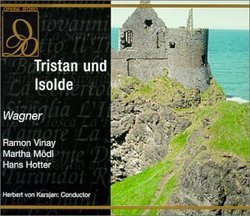| All Artists: Richard [Classical] Wagner, Herbert von Karajan, Bayreuth Festival Orchestra, Gerhard Stolze, Gerhard Unger, Hans Hotter, Hermann Uhde, Ira Malaniuk, Ludwig Weber, Martha Mödl, Ramón Vinay, Werner Faulhaber Title: Wagner: Tristan und Isolde Members Wishing: 0 Total Copies: 0 Label: Opera D'oro Release Date: 10/20/1998 Album Type: Box set Genre: Classical Styles: Opera & Classical Vocal, Historical Periods, Modern, 20th, & 21st Century Number of Discs: 4 SwapaCD Credits: 4 UPC: 723723377326 |
Search - Richard [Classical] Wagner, Herbert von Karajan, Bayreuth Festival Orchestra :: Wagner: Tristan und Isolde
 | Richard [Classical] Wagner, Herbert von Karajan, Bayreuth Festival Orchestra Wagner: Tristan und Isolde Genre: Classical
|
Larger Image |
CD Details |
CD ReviewsA brilliant performance in a poor transfer 07/01/1999 (3 out of 5 stars) "This is one of the finest performances of Tristan ever preserved: exceptionally passionate as a whole, it is both insightfully conducted and sung by voices that are without exception equal to their tasks. Wagner fans will know all too well what a rare combination that is! Unfortunately, this is an "unofficial" release of a radio tape. Many of the problems that bedevil this genre of disc are evident: frequent vocal distortion (especially on Isolde's high notes), orchestral saturation in complex passages, a general greyness of timbre. Other, more expensive, CD editions by Myto and Hunt offer better sound. Not vastly better, but more intelligible. Real fans will find this a bargan, but they will soon want to seek out better editions of this magnificent performance, none of which appear to be sold by Amazon." This one's a treasure Peter Barar | Lansing, Michigan United States | 09/15/2002 (5 out of 5 stars) "This historic Tristan was recorded live at Bayreuth in 1952. It is a great shame that this recording isn't more well known. Despite the rather poor sound, the performance easily competes with any of the classic (but all flawed) recordings now widely available. First of all, the sound is not that hideous. It seems to have been taken from a radio broadcast, and there is heavy distortion at loud orchestral moments. Otherwise, it doesn't get in the way (if you're used to live recordings from the 50s). Because of the sound, it is difficult to catch the subtleties of Karajan's conducting in this performance, but the tempi he takes are very fine, and the drama is perfectly paced. The way he holds the dissonant wind chord just before Tristan's final cry of "Isolde" is pure magic. I've never heard it better. The Bayreuth orchestra is never perfect, but their playing (along with the vocal performances) conveys incredible energy and tension. This is quite possibly the most highly charged recording of Tristan in existence. Mödl was one of the most famous Wagnerian sopranos of the time. She was not nearly as vocally gifted as Flagstad, Nilsson, or Astrid Varnay, but more than made up for this with her intensity. Hers is a fiery Isolde, full of passion. Her voice is a little strange, but one can't fault her vocal execution or passion. Ramon Vinay is quite possibly the best Tristan on record. He had the most unique tenor voice I've ever heard; his tenor is more masculine than most baritones! His high notes are filled with tremendous power behind them, and his musicality is absolutely perfect. No other Tristan I've ever heard (not even Melchior) has such a wonderful mix of power, vocal beauty, phrasing, and acting. His performance alone makes this set priceless. The minor roles are extremely well cast. Hans Hotter was a performing legend, and here he is caught in amazing voice as Kurwenal, and brings an unforgettable tenderness to the part. Ira Malaniuk had a wonderfully rich voice, and hers is a fine Brangäne, full of regret and sorrow. Ludwig Weber, a legendary bass, has a particularly passionate interpretation of Marke. This recording is definitely not for those who are new to Tristan und Isolde, but is wonderful for those who want to explore the opera. I wholeheartedly recommend it in addition to either the Furtwängler or Böhm recordings. Go ahead and grab this one; it's unforgettable." Passionate Wagner Peter Barar | 12/05/1998 (5 out of 5 stars) "This is one of the most marvellous and passionate Tristans ever recorded. Some think that its only peer in the passion category is the currently hard-to-find live recording of Nilsson/Vickers/Boehm. The sound on this inexpensive reissue is much improved over previous incarnations."
|

 Track Listings (6) - Disc #1
Track Listings (6) - Disc #1